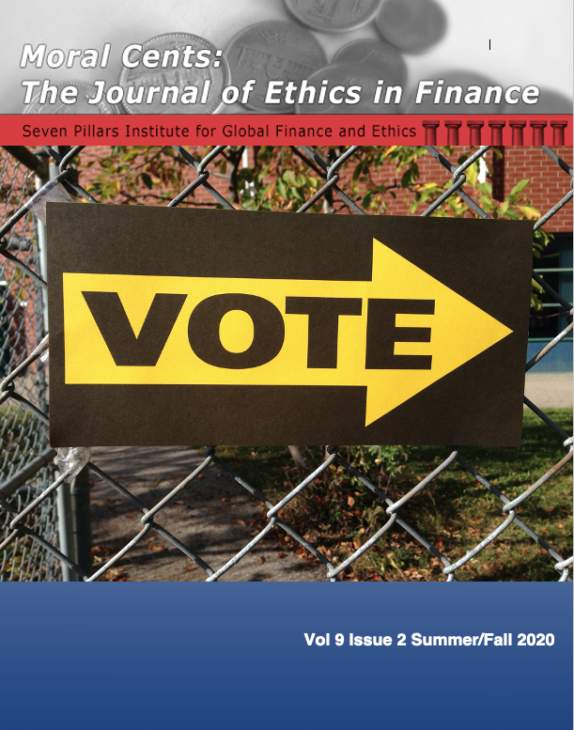Moral Cents: The Journal of Ethics in Finance (Summer/Fall 2020)

The Journal of Ethics in Finance (Summer/Fall 2020)
A consequential election (because really, all elections are consequential) in the US is nearly upon us. Hence, the cover of this issue of Moral Cents: The Journal of Ethics in Finance (Summer/Fall 2020), exhorts you to vote, either early (if your state allows you to; Missouri, the state in which I reside, does not have early in-person voting) or on November 3rd. In either case, please do vote, and hopefully you can practice safe COVID protocols as you exercise this vital democratic right.
The articles in this issue cover topics politicians need to work on and surely, most have articulated their stands and policies on these matters. First, women’s rights and representation in corporations. Second, reasons for and how to tackle rising income inequality. Finally, changing the purpose of corporations from solely profit maximizing, to ensuring other stakeholders such as customers, employees, and suppliers, are treated fairly.
In “Organization-Level Drivers for Gender Diversity in Management: Empirical Evidence from BRICS Nations” Michael Pusic presents his study on the effect of a firm’s industry, size, age, and its percentage of female directors and employees on its share of female managers, while controlling for firm profitability, financial risk, and state ownership. The results he gets from the study are worth a read.
Dallin Overstreet presents his research on “The Negative Impact of Barriers to Entry on Income Inequality”. Using data produced by the World Bank’s Doing Business Index he determines how easy it is to start a business in 180 countries. Barriers to entry include educational requirements, occupational licensing, and start up fees. Overstreet also uses an income inequality measure produced by the World Bank called the Gini Coefficient. The World Bank’s World Development Indicators, from which his data for the Gini Coefficient are taken, are compiled from officially recognized international sources. The results of his research are also worth a read.
The Business Roundtable, an exclusive association of chief executive officers of America’s leading companies, recently recast its statement of purpose for corporations to widespread applause but also some consternation in conservative circles. According to the Roundtable, the new statement better reflects the way corporations can and should operate today. Atrey Bhargava explains the economic and moral foundations of the redefined purpose of corporations. Bhargava critically analyzes the rationale and the subsequent implications of maintaining shareholder primacy as the principal purpose of corporations. He elaborates the five purposes outlined by the Business Roundtable. And then proposes a sixth purpose neglected by the Roundtable: to increase minority representation across corporate governance structures. Needless to say, this research paper also is worth a read.
Indeed, having these informative articles handy and ready to read may help you through the (maybe) interminably long lines as you wait to exercise your citizen’s right to VOTE.
Stay safe, stay well, and good luck on November 3.
Dr. Kara Tan Bhala
Editor-in-Chief
Moral Cents (Summer/Fall 2020)
Moral Cents: The Journal of Ethics in Finance is published by
Seven Pillars Institute for Global Finance and Ethics
ISSN 2326-5663
Editor-in-Chief: Dr. Kara Tan Bhala
Editor: Eric Witmer
